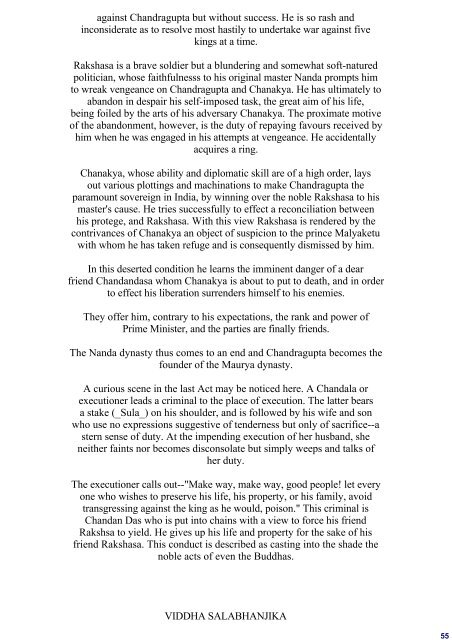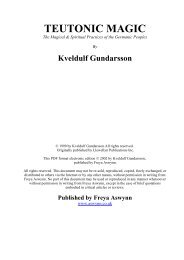TALES FROM THE HINDU DRAMATISTS - Awaken Video
TALES FROM THE HINDU DRAMATISTS - Awaken Video
TALES FROM THE HINDU DRAMATISTS - Awaken Video
Create successful ePaper yourself
Turn your PDF publications into a flip-book with our unique Google optimized e-Paper software.
against Chandragupta but without success. He is so rash and<br />
inconsiderate as to resolve most hastily to undertake war against five<br />
kings at a time.<br />
Rakshasa is a brave soldier but a blundering and somewhat soft-natured<br />
politician, whose faithfulnesss to his original master Nanda prompts him<br />
to wreak vengeance on Chandragupta and Chanakya. He has ultimately to<br />
abandon in despair his self-imposed task, the great aim of his life,<br />
being foiled by the arts of his adversary Chanakya. The proximate motive<br />
of the abandonment, however, is the duty of repaying favours received by<br />
him when he was engaged in his attempts at vengeance. He accidentally<br />
acquires a ring.<br />
Chanakya, whose ability and diplomatic skill are of a high order, lays<br />
out various plottings and machinations to make Chandragupta the<br />
paramount sovereign in India, by winning over the noble Rakshasa to his<br />
master's cause. He tries successfully to effect a reconciliation between<br />
his protege, and Rakshasa. With this view Rakshasa is rendered by the<br />
contrivances of Chanakya an object of suspicion to the prince Malyaketu<br />
with whom he has taken refuge and is consequently dismissed by him.<br />
In this deserted condition he learns the imminent danger of a dear<br />
friend Chandandasa whom Chanakya is about to put to death, and in order<br />
to effect his liberation surrenders himself to his enemies.<br />
They offer him, contrary to his expectations, the rank and power of<br />
Prime Minister, and the parties are finally friends.<br />
The Nanda dynasty thus comes to an end and Chandragupta becomes the<br />
founder of the Maurya dynasty.<br />
A curious scene in the last Act may be noticed here. A Chandala or<br />
executioner leads a criminal to the place of execution. The latter bears<br />
a stake (_Sula_) on his shoulder, and is followed by his wife and son<br />
who use no expressions suggestive of tenderness but only of sacrifice--a<br />
stern sense of duty. At the impending execution of her husband, she<br />
neither faints nor becomes disconsolate but simply weeps and talks of<br />
her duty.<br />
The executioner calls out--"Make way, make way, good people! let every<br />
one who wishes to preserve his life, his property, or his family, avoid<br />
transgressing against the king as he would, poison." This criminal is<br />
Chandan Das who is put into chains with a view to force his friend<br />
Rakshsa to yield. He gives up his life and property for the sake of his<br />
friend Rakshasa. This conduct is described as casting into the shade the<br />
noble acts of even the Buddhas.<br />
VIDDHA SALABHANJIKA<br />
55
















